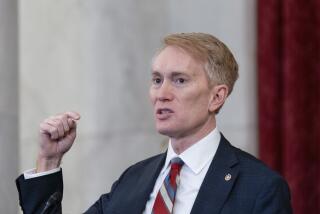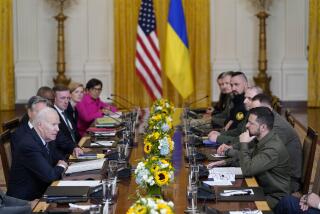Obama heads to Asia, putting budget fray at arm’s length
With his approval ratings low and Congress deadlocked over federal spending, President Obama has adopted a straightforward plan for the month — get out of town.
Obama will be out of Washington almost a third of November, at a time when Republican critics say he should be holed up with them working closely to solve the nation’s many ills.
White House officials defend the trips, including a weeklong visit to Asia coming up, calling them job producers. Obama uses the travel to meet with foreign leaders to promote U.S. trade, they say.
Privately, they also indicate the believe the trips represent smart political strategy.
Over the summer, Obama was drawn deeply into congressional budget fights. He ended up frustrated and damaged in the polls. The lesson White House aides have drawn from the experience is the value of an arm’s-length stance.
Congress will spend much of the next week focused on renewed battles over the federal budget. A deadlock seems the most likely result, and Obama’s strategists believe the president benefits by keeping his distance, even if he gets criticism for being away from the office.
Obama already has detailed his plans publicly and made his priorities on the budget clear, but Congress has to pass a bill, one senior official said.
“We’re not going to be in the backroom writing this thing for them,” said the official, who requested anonymity to discuss internal planning. “He will be getting things done when he’s traveling.”
The strategy is a time-honored one. For decades, presidents frustrated by domestic-policy stalemates have turned to overseas travel, seeking the international stage and initiatives that require no new legislation.
Over the coming week, Obama will convene a summit this weekend on Asian affairs in Hawaii, then head to Australia and Indonesia, where opportunities to appear presidential dominate his itinerary: meetings with world leaders, the annual Asia-Pacific economic summit, and speeches that affirm the United States’ commitment to democracy and security in the region.
Republicans consider it a cheap way out. They’re not criticizing him for attending the G20 summit in France last week nor the Asia-Pacific Economic Cooperation meetings — his predecessors routinely attended the same gatherings — but they nonetheless criticize what they call detachment from budget negotiations.
“Tending to these obligations wouldn’t be inconvenient if the president hadn’t already been so disengaged from the legislative process over the last two months,” said Brendan Buck, a spokesman for House Speaker John A. Boehner (R-Ohio).
Most of Congress’ work right now involves the so-called super committee, which has a Nov. 23 deadline for reaching agreement on a long-term plan to reduce the deficit. White House expectations are low that the super committee will succeed. The likelihood of a deadlock only cements the West Wing plan to ignore attempts to lure Obama into a back-and-forth.
“When you’re the incumbent president, you’re always better off politically when you act like the president,” said Larry Sabato, director of the University of Virginia’s Center for Politics. “You don’t want to get into petty arguments. You want to be above it all. Obama forgot that for a while and seemed like just another squabbling politician. … People think that’s especially unbecoming to the president.”
Just to be safe, the trip director is choreographing things so that Obama doesn’t appear to be enjoying a whirlwind tourist excursion.
He has summits and one-on-one meetings with world leaders, including Chinese President Hu Jintao, during his three days in Honolulu.
On Wednesday he is set to arrive for a twice-canceled visit with Australian Prime Minister Julia Gillard. On Friday, Obama goes to Indonesia for summits of two different Asian organizations.
He will spend a day in Bali, known among surfers for great waves. But Obama is not scheduled to go anywhere near the beach.
In addition to trade, Obama also intends to emphasize the U.S. role as an anchor of security in the Asia-Pacific region, a role central to American alliances with Australia, Korea and Japan.
“When the American people see the president traveling in the Asia Pacific, they will see him advocating for U.S. jobs and U.S. businesses,” said Ben Rhodes, the president’s deputy national security advisor for strategic communications. “When you ask why we are so focused on this region, an overwhelming reason is because of the economic potential, and the direct tie-in to people at home.”
More to Read
Start your day right
Sign up for Essential California for news, features and recommendations from the L.A. Times and beyond in your inbox six days a week.
You may occasionally receive promotional content from the Los Angeles Times.







